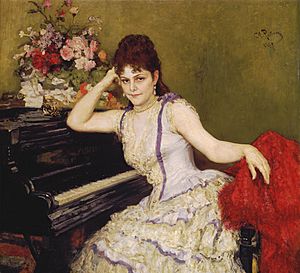Sophie Menter facts for kids
Quick facts for kids
Sophie Menter
|
|
|---|---|

Portrait by Ilya Repin.
|
|
| Background information | |
| Genres | Classical music |
| Occupation(s) | Pianist |
| Instruments | Piano |
Sophie Menter (born July 29, 1846 – died February 23, 1918) was a famous German pianist and composer. She was the favorite female student of the legendary musician Franz Liszt. People in Paris called her "l'incarnation de Liszt" (meaning "Liszt's spirit in human form"). This was because of her strong and exciting way of playing the piano. Many thought she was one of the best piano players of her time. Sophie Menter passed away in Stockdorf, a town near Munich.
Contents
Sophie Menter's Life Story
Sophie Menter was born in Munich, Germany. Her father, Josef Menter, was a cellist, and her mother, Wilhelmine Menter, was a singer. Sophie started learning piano at a young age. She studied with Siegmund Lebert and later with Friedrich Niest. When she was just 15, she performed a difficult piece called the Konzertstück by Carl Maria von Weber. She played it with a full orchestra, led by Franz Lachner.
Early Concerts and Teachers
Sophie's first concerts took her to cities like Stuttgart, Frankfurt, and places in Switzerland. In 1867, she became well-known for playing Franz Liszt's piano music. She performed at the famous Gewandhaus in Leipzig. In Berlin, Sophie met the well-known pianist Karl Tausig. She studied with him and also with Hans von Bülow. In 1869, she became a student of Franz Liszt himself.
Marriage and Teaching
From 1872 to 1886, Sophie Menter was married to a cellist named David Popper. They had a daughter together named Celeste. In 1881, Sophie performed in England for the first time. Two years later, she was given an honorary membership in the Royal Philharmonic Society. In 1883, she became a piano professor at the Saint Petersburg Conservatory. However, she left in 1886 to focus on her concert tours again.
Her Unique Performances
Sophie Menter was so popular that she could play music other pianists wouldn't dare to touch. For example, she played Liszt's First Piano Concerto in Vienna in 1869. This was 12 years after its first performance there, which had not gone well. One of her special concert pieces was called Rhapsodies. This was a mix of three of Liszt's Hungarian Rhapsodies (Nos. 2, 6, and 12) and parts from others. She also wrote several piano pieces herself. They were mostly in a very showy style. However, she often said her own composing skills were "miserable."
What Made Sophie Menter Special
Franz Liszt, her teacher, called Sophie Menter "my only piano daughter." He also said, "No woman can touch her." He especially admired her "singing hand," which meant she could make the piano sound like it was singing.
Critics' Views
A music critic named Walter Nieman described her playing style. He said it was a mix of amazing skill and grace. She had a big, full sound like Liszt's. She played with fiery energy and a strong touch on the keys. Her playing was also very clear and well-formed. He felt that her soul, spirit, and technique all worked together perfectly.
George Bernard Shaw, a famous writer who heard Menter play in 1890, was very impressed. He wrote that she played with a "magnificence" that was better than other famous pianists. He noted that she played very fast but always clearly. Every note she played was distinct, which made her performances feel incredibly powerful.
Tchaikovsky's Connection
The famous composer Pyotr Ilyich Tchaikovsky knew Sophie Menter well. He dedicated his Concert Fantasia for piano and orchestra to her. In September 1892, while staying with her in Austria, Tchaikovsky helped her arrange her piece Ungarische Zigeunerweisen (Concerto in the Hungarian Style) for piano and orchestra. He even conducted the first performance of this work in Odessa four months later.
See also
 In Spanish: Sophie Menter para niños
In Spanish: Sophie Menter para niños
 | Mary Eliza Mahoney |
 | Susie King Taylor |
 | Ida Gray |
 | Eliza Ann Grier |

